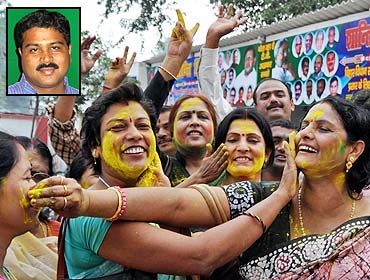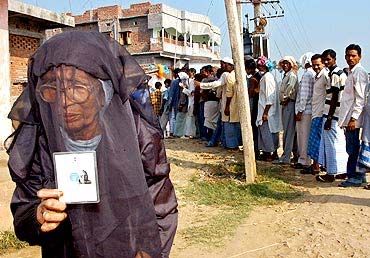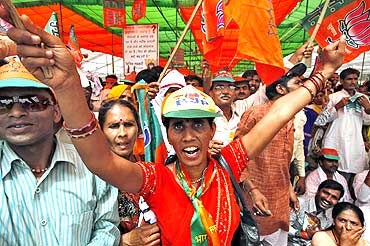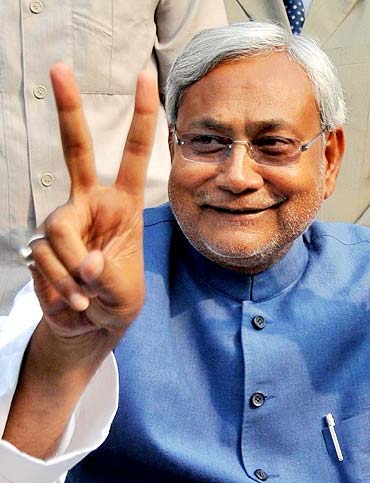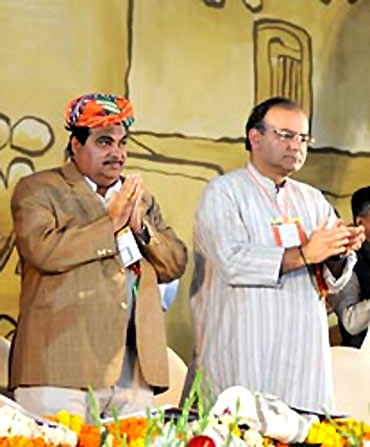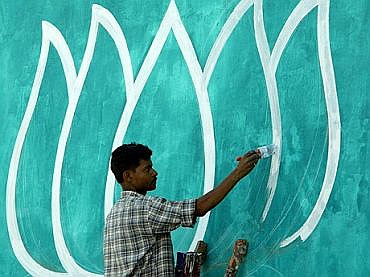 | « Back to article | Print this article |
How BJP created poll magic in Bihar
The Bharatiya Janata Party stunned everyone -- including itself -- by winning 91 out of 102 seats it contested. That is 89 per cent seats, and an increase of 36 seats from the 55 it won in 2005, contesting the same number of seats.
Dharmendra Pradhan, BJP general secretary-in-charge of Bihar, who was part of the backroom team that planned the campaign, tells rediff.com's Krishnakumar P how the party managed this staggering conversion rate.
The party's expectations and estimates: "After handing out tickets, when we started campaigning, we thought we would win 70 seats. But after the second phase of polling, we could sense a change in the tide. After the fourth phase, there was a sense of jubilation everywhere and our workers began to think anything was possible. But we definitely could not visualise the kind of number we ended up with," said Pradhan.
"But from the public response, and by independent observers and psephologists' estimates, we got the idea that we will get 40 per cent votes. When projected into seats, that meant 115-120 for the Janata Dal-United and 80-85 for us. Once that base figure was known, we were hoping for an unexpected number," he added.
Click on NEXT to read further...
'Muslims from Laluji's vote bank choose BJP'
'BJP's victory, the ultimate effort of workers'
At the district-level meetings, the BJP had one-on-one talks with party workers. Pradhan claimed that he alone had personal one-on-one meetings with around 5,000 people in 120 constituencies in two to three months. "We got their suggestions and feedback. We understood the caste equations in the constituencies," he said.
"Then we commissioned a good independent survey. Earlier, people could sit in a hotel room and say we did the survey. There was no way of knowing if the agency went to the field. So, this time we asked the agency to show us evidence. This we did by using the global positioning system. So, if the agency said the sample size in a constituency was 700, we would have 700 record points, with the place, time, date and all other details," he added.
So, though it was low-profile, low-key campaigning, we had gotten the basics right, and were confident that we had the right picture all the time. With this as the starting point, we then set out into micro-management.
Say there are 500 key workers in a constituency. We decided what role each would play and put in place a military-style command system. All our state-level general secretaries were there. They were all on the move all the time. Thus this is the ultimate effort of the workers. That is the key to success. If you plan in advance and plan in detail, and the workers execute it perfectly, nothing is impossible.'Nitish reached out to the weaker sections of society'
Winning over weaker sections of society: The BJP general secretary said that caste remained a huge challenge in the state. "People say caste shackles have been broken. But the caste challenges remain in Bihar. True, the caste grip was loosened, but development was not the only factor. The caste factor was also there," said Pradhan
"But in that sense also, Nitish had ensured that the weaker sections of the society gained a lot from the development. So working towards development, and taking care of the weaker sections was the greatest achievement. He created the Mahadalits and the extremely backward community statuses and worked for their betterment," he added.
According to him, the party had to continuously monitor the caste equation in each seat.
"During the campaign, we had a continuous measure of what the situation on the ground was. And the mood was also generally in our favour. For example, if we put up a candidate, there was so much pro-NDA pressure from the people that even dissidents backed off and began working for the party," he said.'We owe this victory to Gadkari, Jaitley'
"Jaitley knows Bihar's caste mobilisation and what the major sections are. He knows every nook and corner of Bihar. So he coined a very apt slogan -- Badta Bihar, Banta Bihar. In four words it captured that this is a resurgent Bihar, but there is still work to be done and it can't be squandered. So, this was followed by 'Nitish-Sushil, phir ek bar'. So the branding he did was very simple yet powerful," he added.
According to him Nitish Kumar appeals to around 2 crore people through telephone was very effective. "Bihar has very few landlines, but there are 3 crore mobiles. We targetted that segment. Above all, the people had a strong faith in Nitish Kumar's leadership."
